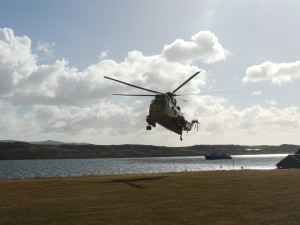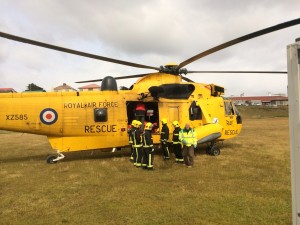One question every doctor will have been asked numerous times throughout their training and career is “why did you want to become a doctor?” For the first time I asked myself this question the other day after talking to a young soldier, sitting in the ED waiting area watching the news as the New York apartment explosions unfolded.
I stopped to see what was happening on my way past. As we chatted about what we thought was the cause of the explosions was we posed the question of what we would do if we found ourselves in a situation like that. I said that I would like to think I would be able to help out in someway – help get people out or assist medically. He said in response, “I don’t know what I would do, my job is to kill people not save them.”
It was the utter casualness in the way he said this that left me completely speechless. As though fighting in wars was no different to a nine-to-five mundane day-job. It scared me slightly to know this 19 year old lad has already been to Afghanistan and seen horrors that nobody should ever have to see. No wonder the rates of Post Traumatic Stress Disorder here are through the roof.
I never got the chance to ask him why he joined the army – perhaps I was afraid to ask, but it did lead me to ask myself this question – “why did I want to become a doctor and do what I do?”
Personally, I have never really known what my answer should be. There are many aspects of medicine which appeal to me. The challenge of working up a patient and figuring out a diagnosis keeps my mind active and satisfies my love of problem solving. Meeting people from all over the world with all sorts of different backgrounds keeps the work diverse and interesting. And being able to successfully treat patients and improve their quality of life is a satisfaction second to none.The second question you get asked is “what do you want to specialise in?”. That answer I do know; Rural Medicine. Hands down, no doubt. Whether it is General Practice or being the sole doctor on call in a rural hospital ED you really never know what is going to walk through the door. This was highlighted to me last week.
Wednesday afternoon was slow going here in the hospital so I joined the visiting Dermatologist for his clinic. The SMO from the military base also happened to be there, eager to pick up tips and tricks. So we spent the afternoon looking at rashes and psoriatic plaques, discussing the pros and cons of various emollients, moisturisers and steroid creams.
Thursday morning dawned with a fatal Motor Vehicle Accident, one person deceased on arrival and another 3 casualties being transferred to us. The second time I met the SMO he was handing over 3 critically ill patients to me in the back of an RAF helicopter. An absolute stark contrast to the day before.
I got to supervise the transfer of the patients to the hospital where the rest of the team were standing by to receive them. The first patient was a 24 year old who was thrown 30ft from the vehicle. He sustained a fracture dislocation of his left shoulder, a stable pelvic fracture, a full thickness scalp laceration and numerous other smaller lacerations.
The second patient was the 24 year-old’s father. He was the driver and had been wearing a seatbelt. We were unable to clear his C-spine with x-rays so he spent the next few days in a hard collar. Other than bruises from his seatbelt he had no other major injuries.
The third patient was also thrown from the vehicle. On x-ray he had fractured one of his fingers and we once again couldn’t clear his C-spine, so he also had to have a hard collar. This complicated things as he also had significant facial and scalp lacerations which resulted in his entire head and neck swelling up significantly and nearly compromising his airway.
After stabilising each patient we took the first to theatre to reduce his shoulder and clean up his scalp. The third patient was also taken to theatre and had around 30 stitches to the two major lacerations on his scalp and face and we splinted his fractured finger.
All three patients required urgent CT scans so the wheels were set in motion to get them flown out. Saturday afternoon things finally got moving and it was back into the helicopter to see them safely transferred to the airport. It was really satisfying to see all three patients stable and comfortable on the aeroplane knowing they had all been in pretty dire straits only two days before.
For me this case involved numerous aspects of rural medicine which I love. For starters as I said above, you never know what is going to walk through the door. In the morning you may be treating somebody’s sore throat in the GP clinic and in the afternoon performing CPR on the roadside or assisting reduce a fracture in theatre.
Emergency medicine has always appealed to me. Having to think on your feet and act with instinct always gets the adrenaline flowing. Rural doctors are often the first people on the scene of accidents or are required to accurately diagnose and then treat medical emergencies that may present to them as a GP.
The satisfying thing about this case was that after the patients were stabilised in ED I was still able to follow them through and help manage them in theatre and on the in-patient ward. In secondary and tertiary hospitals, once the ED staff have handed the patient over they don’t have any further contact and often never find out what the end result was.
As a rural doctor you are often responsible for every step of a patient’s hospital stay, from presentation to discharge. This continuity of care has always appealed to me and is something only General Practitioners and Rural Doctors are privileged to. If you ask me Rural doctors get the best of both worlds.
It’s not all about medical practice though. During my travels it is always the rural communities who stand out to me. I have been here for only three weeks now, and feel thoroughly a part of the Falklands community. Right from the start everyone was welcoming and went out of their way to make me feel at home.
People will come up and introduce themselves and take an active interest in where you are from and why you are here. It’s not like being in the city where everyone has their own little cliques and would sooner sit and stare at you than strike up a conversation with a stranger.
I will always be a country-girl at heart and not just for the people but the environment as well. Here it is a 15 minute walk to the rugged windswept hills where you can get 360 degree views of valleys, mountains and the ocean. You can be out tramping all day and never see a sign of another human being.
An hour’s off-road driving in another direction and you are sitting in the middle of the largest accessible king penguin colony in the world with young penguins coming right up to you and nibbling at your fingertips. Out on the harbour I found myself surrounded by a pod of whales with penguins skimming across the surface and curious seals coming right up to the boat and ducking and diving through the water.I witnessed one of the most beautiful sunsets (and I’ve lived on New Zealand’s West Coast for a year!) while sitting out on the water watching thousands of Sooty Shearwater birds swarm the sky as they come in from sea to their nests on a remote little island.
The landscapes are breath-taking, the wildlife majestic, the people are like family and the work thrilling and diverse. This is rural medicine!





2 Comments to 'Blog 2: From Rashes to Roadside Rescus by Rebecca Craw'
March 30, 2014
Awesome post Reb 🙂 Sounds like you are having a great time !
April 1, 2014
Great blog. Good to see you’re going well. BUT where are the sheep and have you saved any lambs?
Leave a comment